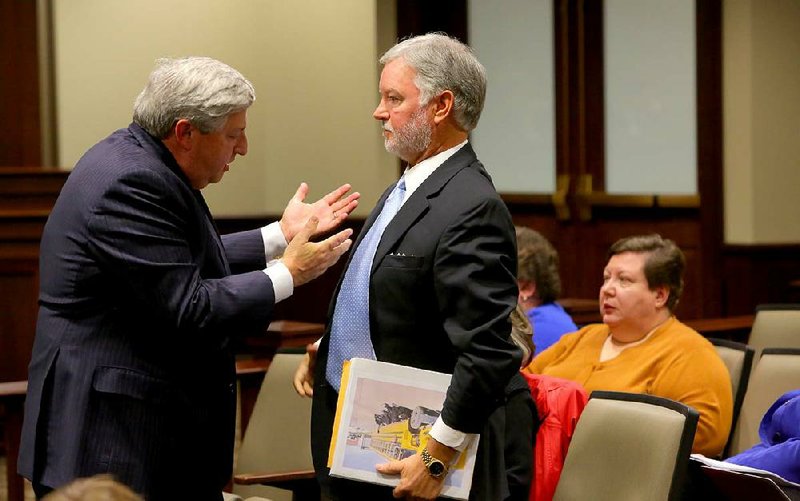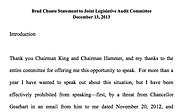“Inadequate financial management controls and … questionable accounting practices” drove the multimillion-dollar deficit in the University of Arkansas at Fayetteville’s fundraising division, according to Brad Choate, the division’s former chief.
RELATED ARTICLE
http://www.arkansas…">Vote shuts off testimony on deficit at UA
Chancellor G. David Gearhart and other top school officials blamed him for “being inattentive and neglectful in my duties [to] deflect attention away from some even more serious, systemic problems” that would have reflected badly on them, Choate said in a statement released Friday.
“If Gearhart had remained vice chancellor for [the Division of University] Advancement, I am confident he would be sitting here today trying to set the record straight. However, that presumes his chancellor would also have panicked and thrown him under the bus,” Choate wrote in a statement he had planned to deliver Friday to the Legislative Joint Auditing Committee in Little Rock.
Document set
University of Arkansas-Fayetteville Audit
Choate, former vice chancellor for advancement, didn’t get to speak to the committee because members accepted a state auditors’ report on the deficit and shut off discussion.
After the meeting, state Sen. Bryan King, R-Green Forest, released a copy of Choate’s statement to the Arkansas Democrat-Gazette.
One of the university’s most successful fundraisers, Choate was to speak publicly for the first time Friday about how the Advancement Division under his leadership became mired in deficits that grew to more than $4 million.
Gearhart, Choate and others have said they had no idea the division was overspending until the UA Foundation froze its funds in July 2012.
University officials say they have plans to pay off the division’s cumulative deficit, using emergency reserve funds. But they say they are still trying to find solutions to cover an ongoing gap between revenue and spending of about $2 million for the division this fiscal year and potentially for future years.
Choate resigned under pressure in June from his $348,175-a-year job, one of the highest-paying and most prestigious at the state’s largest public university.
Gearhart and school finance officials have blamed Choate and former budget officer Joy Sharp for the deficit problem, saying that they failed to monitor the division’s spending and that Sharp made accounting errors.
Sharp has not spoken publicly, but in a letter to university officials, she admitted making accounting mistakes because of overwork.
State auditors, whose report was made public Sept. 10, also criticized the accounting practices of the university’s top finance officials and said those officials did not disclose all information about the Advancement Division problem as soon as they should have.
Choate told reporters Friday that he couldn’t talk until now about the financial bungle because he signed an agreement with university officials in February that prohibits him from disparaging top staff members, including Gearhart.
Choate and Gearhart had been friends and co-workers for more than 20 years before the financial crisis occurred.
Choate’s prepared statement also cited a Nov. 20, 2012, email from Gearhart that criticized Choate for blaming the university’s chief financial officer, Don Pederson, for the financial problems that led to Choate’s eventual resignation.
“If I continue to hear these reports, I will be forced to remove you from this building and assign you space elsewhere. The other alternative is to dismiss you immediately for cause,” Gearhart’s email said.
Choate’s statement added: “As you can see, he was giving me serious career and financial reasons — threats, actually — not to share what I had learned about what had occurred and why it happened.”
Choate’s 15-page, typed statement also said his own encounters with university administration staff members supported allegations made by former university spokesman John Diamond about a Jan. 14 meeting of top Advancement Division staff members.
In September, Diamond told the audit committee under oath that Gearhart lost his temper in the January meeting and told Advancement Division officials to “get rid of” budget documents and to not create others, so the public couldn’t ask for and be given the documents.
Gearhart, who also was under oath, told the committee that he never asked anyone to destroy documents.
“At great risk to his future employment possibilities, John Diamond told you the truth,” Choate’s statement said. “I was still working in my office that day and within 60 seconds of that meeting ending, both [advancement staff members] Laura Villines and Denise Reynolds came back to the office and their eyes were wide open …
“They told me and Stephanie McGuire [a secretary at the time] that Dave had pitched a major fit. That he had used very foul language with reference to me; that he had pushed a stack of budget sheets Denise had prepared back at her and told her to, quote, “get rid of these and stop putting budget information on paper.”
Later that day, Choate heard the same story from three others who attended the meeting, according to his statement.
To support his claim that the university’s own weak financial controls contributed to the growth in the fundraising division’s deficit, Choate’s statement noted that:
He didn’t learn until fall of 2012 — after the overspending was discovered that July — that Sharp had misrepresented finances and that the university had no system to ferret out the problem.
“We were making personnel and budget decisions based on the information Joy provided,” Choate wrote in his statement. “That was compounded by the fact that the university itself did not have a system of checks and balances at the CFO (chief financial officer Pederson) level that would have detected the budget problems.”
Top finance officials “were quietly booking millions in a non-existent ‘receivable’ at the close of the fiscal year, and then removed them just as quietly … They concealed that action from me.”
State auditors later criticized the university treasurer’s office practice of entering more than $2 million in accounts receivables for fiscal 2011 and 2012.
Choate said he met with Pederson “at least once a week in our executive committee meeting, yet he never mentioned any financial issues or financial transactions pertaining to my division.”
School Treasurer Jean Schook’s report on the deficit, which blamed Choate and Sharp, conflicted with what Schook and the Advancement Division’s new budget officer, Reynolds, said as they investigated the problem.
“In Jean’s words, Joy had been ‘masking’ the real condition of the division’s finances. She and Denise both said — on that day and on multiple other occasions — that there was no way I would have been able to realize what she was doing. They also said that her misrepresentation of finances appears to go back to the time when Dave Gearhart was in charge of advancement, and that he wouldn’t have been able to spot what was going on, either.”
Gearhart’s office booked meetings on Gearhart’s schedule showing weekly meetings with Choate, knowing those meetings would not actually take place but wanting the public to think otherwise.
“At one point the chancellor’s office posted monthly meetings between Dave and I on my schedule,” Choate’s statement said. “However, about 10 minutes before the first meeting was to occur, Judy Schwab, Dave’s associate vice chancellor for administration, came to see me. She told me the meetings with Dave were not really going to happen. She told me Dave had directed the meetings be put on our schedules in case the media FOIA’d (filed a Freedom of Information request for] his schedule.”
State auditors erred in saying Sharp approved Advancement Division expenditures. Choate said he allowed Sharp to log into the budget accounting system with his password only to approve transactions they had discussed — and he had authorized.
“I approved all expenditures that required my password,” his statement said.
Front Section, Pages 1 on 12/14/2013

